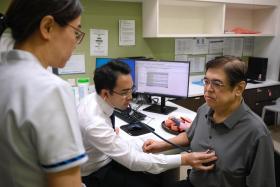Physiotherapy can help prevent chronic diseases like diabetes
Even though it is mostly regarded as a reactive treatment, physiotherapy is also a form of preventive care.
It can even help prevent chronic conditions such as diabetes and heart diseases.
Mr Chng Chye Tuan, senior principal physiotherapist at Core Concepts, Singapore's largest physiotherapy and functional wellness group, told The New Paper: "Physiotherapy is both a preventive treatment and reactive measure which has the potential to strengthen the body against ailments and diseases."
The 36-year-old said physiotherapy assesses and treats movement disorders occurring from physical disabilities, trauma or illness.
It employs techniques such as manual therapy (joint mobilisation, muscle stretching and massages), exercise therapy (pilates), sports physiotherapy and workplace ergonomics (posture and workstation set-up recommendations) to help patients relieve pain, enhance musculoskeletal strength and improve respiratory function.
Citing heart disease as an example, Mr Chng said a physiotherapist can prescribe exercises such as upper body resistive strengthening to improve heart and lung functions and prevent heart diseases that stem from cholesterol issues, hypertension and a lack of exercise.
Similarly, physiotherapy can help prevent diabetes through fitness conditioning that reduces glucose intolerance.
But Mr Chng said many Singaporeans tend to seek physiotherapy treatment only in response to injuries or pre-existing diseases.
He said: "Our culture still takes a fairly reactive approach to healthcare - of not fixing it if it isn't broken.
"Our ageing population has given rise to mobility issues and chronic diseases, which has led to a higher demand for physiotherapy."
And physiotherapy is taking its place in Singapore's evolving healthcare ecosystem.
Since 2015, the number of licensed physiotherapists has increased by 17 per cent.
In 2016, the Singapore Institute of Technology launched a physiotherapy undergraduate programme.
Citing a 2017 Nielsen study, Mr Chng said: "With obesity levels up by 24 per cent in the last 25 years, Singaporeans often fall on two extreme ends of the spectrum in their lifestyles.
"Those who haven't exercised in a while may return with a fitness regimen that is too intense. Physiotherapists can advise individuals to take a holistic approach that integrates exercises and lifestyle practices suitable for their body and needs."
Mr Chng added that physiotherapy is not limited by age or condition.
He said: "Many think that physiotherapy is useful only for the elderly, but even babies can benefit from physiotherapy."
Get The New Paper on your phone with the free TNP app. Download from the Apple App Store or Google Play Store now


